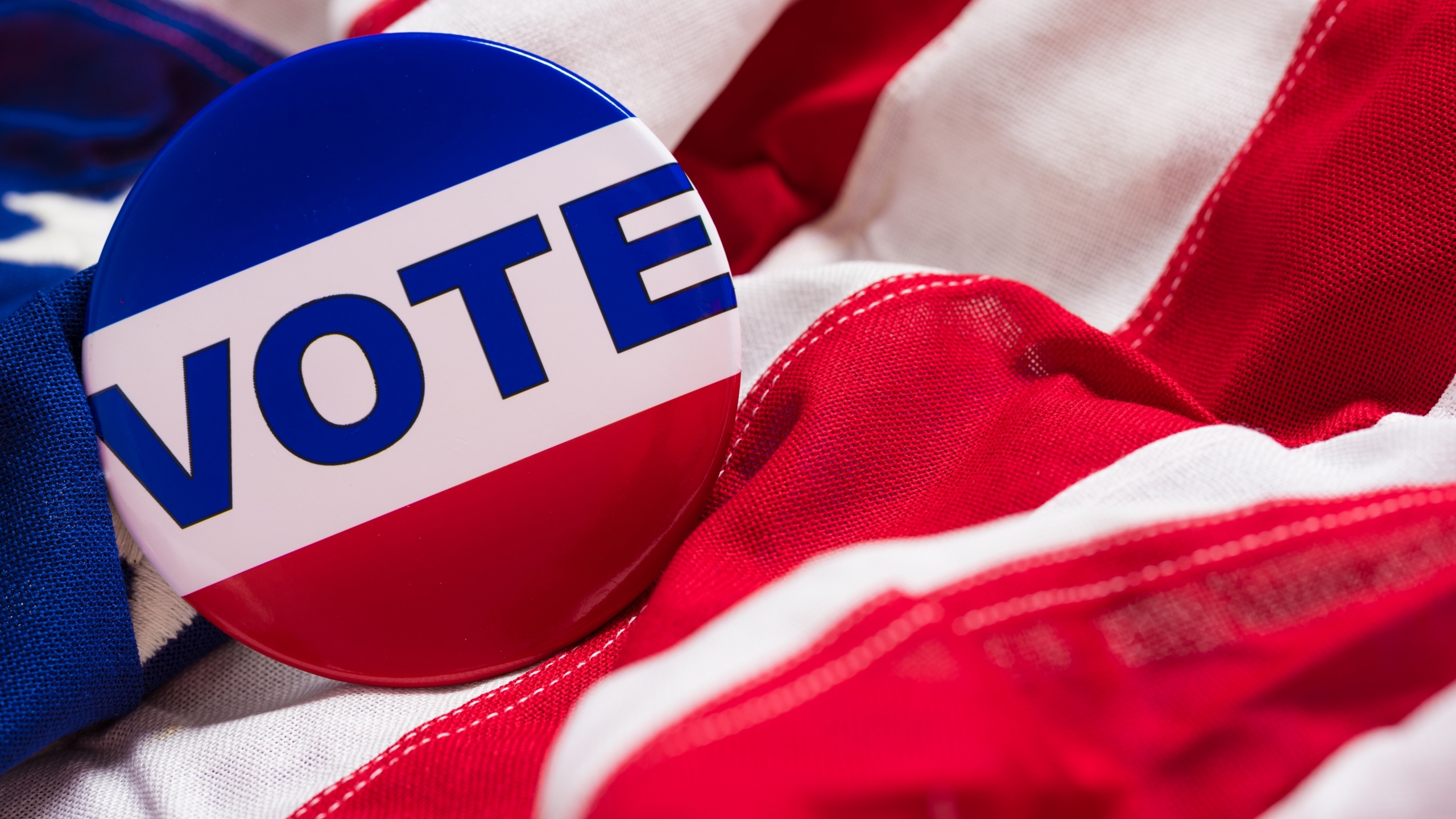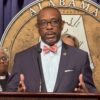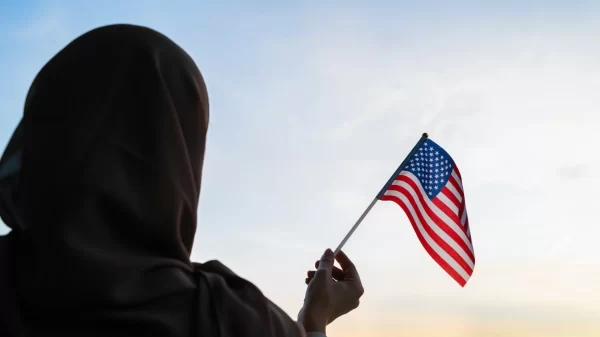In the handful of competitive state House and Senate districts, Alabama Democratic candidates are maintaining impressive levels of fundraising and mobilizing, all despite districts being drawn to preserve the Republican super-majority in the state.
Nationally, Democrats are seeking to politically capitalize on the recent legislative victories by the Biden administration, as well as the landmark Dobbs v. Jackson Women’s Health Organization decision by the U.S Supreme Court in late June, which ended the constitutional right to an abortion.
Whether the increases in voter registration, particularly among women, seen in other states and the rising polling numbers for Democrats leading into the 2022 midterms affect state-level races in Alabama remains to be seen. Alabama Secretary of State John Merrill said in an interview with APR that there has not been a noticeable increase in voter registration among women, as has happened elsewhere.
“We have averaged about 5300 new voters being registered each week since I’ve been the Secretary,” Merrill said. “Some weeks has been higher than others. Some weeks it’s a little bit lower. I don’t ever remember being below about 3000. I don’t ever remember being above about 9000. But that’s when we’ve been coming up on an election or something’s been going on. But we have not seen a change in that well before Roe v. Wade was overturned by the Dobbs decision.”
Demographic shifts infusing more Democratic-leaning voters into toss-up districts, particularly in major metropolitan areas, as well as the number of funds generated by some campaigns, are contributing reasons for Democratic candidates performing as they have in the few competitive districts remaining — despite the overall demographic makeup heavily favoring continued Republican supremacy.
The current Democratic makeup of the Alabama State Legislature is 28 Democratic Representatives in the state House, and eight Democratic Senators in the state Senate, for a total of 36 elected officials registered as Democrats in both chambers.
Those competitive district-level races, as acknowledged by most observers, include but are not limited to:
Alabama state Senate districts:
- District 2, between Democratic Nominee Kim Lewis and incumbent Republican state Sen. Tom Butler, R-Huntsville;
- District 7, between Democratic Nominee Korey Wilson and incumbent Republican state Sen. Sam Givhan, R-Huntsville;
- District 21, between Democratic nominee Lisa Ward and incumbent state Sen. Gerald Allen, R-Tuscaloosa;
- District 27, between Democratic nominee Sherri Reese and Republican nominee Jay Hovey.
Alabama state House districts:
- District 10, between Democratic nominee Marilyn Lands and Republican nominee David Cole.
- District 74, between Democratic nominee Phillip Ensler and incumbent Charlotte Meadows, R-Montgomery.
- District 63, between Democratic nominee Samuel Adams and incumbent Cynthia Almond, R-Tuscaloosa.
- District 47, between Democratic nominee Christian Coleman and Republican nominee Mike Shaw.
- District 25, between Democratic nominee Mallory Hagan and Republican nominee Phillip Rigsby.
In an interview with APR, Alabama Democratic co-chairwoman Tabitha Isner identified several Alabama state House and Senate districts where Democrats remain competitive and said that the party would put particular focus on those races, with an emphasis on the Alabama state Senate, for the upcoming general election in November.
“We are focusing on the ones where we think a strong ground game and a clear message will give us an opportunity to flip a district,” Isner said. “I’m happy to see that our candidates do have strong messages and are able to draw a clear contrast between themselves and their opponents and clearly communicate to the voters what the values are that they’re fighting for, and how the current leadership has let the state down.”
A district receiving attention in recent months has been Alabama state House District 25, which is the district of the outgoing Alabama Speaker of the House Mac McCutcheon, R-Monrovia, and a district that has been securely Republican for at least two decades.
Mallory Hagan, a former Democratic candidate for Alabama’s 3rd Congressional District and winner of the 2013 Miss America Contest, is the Democratic nominee in the 25th state House District and remains one of the few, if not the only Democrat this election cycle to outperform a Republican opponent in a district currently occupied by a Republican in both cash-on-hand and overall financial support.
According to financial records from the Alabama Secretary of State’s office, in the last month, Hagan has raised a little over $40,000, compared to her opponent, small business owner Phillip Rigsby, who raised approximately $10,435.
Total contributions to Risgby over the length of his campaign equal almost $99,000, according to the contribution records, with Hagan netting approximately $4,000 more for a total of $102,586.41.
“We have run a grassroots campaign,” Hagan said in an interview with APR. “We’ve had over 900 contributions to our race. The average donation is a little under $100, and what that means is that people are resonating with the energy that our campaign brings to this race and to politics and Alabama in general.”
Hagan said that reproductive rights are a key issue for potential voters that she’s encountered on the campaign trail in Madison County.
“When I’m knocking doors, every single day, the topic of conversation that continues to come to the forefront is the restoration of women’s reproductive rights, and in particular in cases of rape or incest,” Hagan said.
Hagan also mentions that she has seen a “noticeable” increase in women participating in her campaign after the Dobbs decision.
“We have seen an increase in volunteer outreach to our campaign from women, mothers, teachers, community organizers,” Hagan said. “Much of it is that my opponent has stated that he agrees with the abortion ban in place in Alabama even in cases of rape or incest, and I think people really understand that this is just the first step.”
The relatively suburban areas surrounding Huntsville have seen dramatic shifts in its population size over the past several years and is the scene of a second competitive race between state Sen. Tom Butler, R-Madison, and his Democratic Challenger Kim Lewis. Butler successfully warred off a Republican challenger and former state Senator for District 2, Bill Holtzclaw, during the May primaries and has spent a considerable amount of his over $1 million raised. Butler’s ending balance, as of August, is approximately $38,166.63, just over $10,000 more than Lewis’, who reports approximately $27,859.70, according to her campaign’s latest financial report.
The vast majority of Butler’s financial report, according to campaign finance data, shows his financial support coming primarily from political action committees, with approximately $798,929.93 in-total financial support coming from PACs during this election cycle. Comparably, the majority of Lewis’ financial support comes from single donors, with approximately $58,572.85 of her over $95,000 raised during her campaign coming from individuals.
Lewis, a businesswoman and the first African-American woman to be elected as board chair of the Huntsville/Madison County Chamber of Commerce, has received approximately $8,509.33 cash contributions, plus $5,498.93 in in-kind contributions for this last month of fundraising. In the same period, Butler received approximately $48,592.40 in financial support from PACs located in Montgomery and Jasper, according to the financial report.
“My opponent has raised a lot of money for his primary, but most of that money came from PACs and did not come from individuals that are here in the community,” Lewis said in an interview with APR. “I think the people here know my character, my beliefs, and know that I’m going to do the right thing, and they are behind me and supporting me, and that’s why I’ve been so successful in the fundraising.”
Issues among voters that Lewis has spoken to are similar to those heard statewide: Gun policy, economic growth, and reproductive rights, with education being the highest among priorities for District 2, according to Lewis.
“Alabama’s falling short and a lot of areas in the education arena, and we want to maintain what we currently have, and actually raise it to the next level,” Lewis said. “We’ve got to move the needle on education because it has been stagnant for so long.”
Lewis also spoke on how reproductive rights are mobilizing women voters in the district.
“When we’re out talking to people, it is women that are showing up,” Lewis said, mentioning the women’s rally held in July after the Dobbs decision at the Madison County Courthouse.
“It was the largest that the state had, of people out supporting and engaged,” Lewis said. “It’s definitely something that people want to see protected, and want to make sure that they have legislators [In Montgomery] that are willing to listen to them and make those choices.”
District 2’s voter base has also changed significantly since, according to Lewis, with the latest district-level demographic estimates placing the non-white voting-aged population at approximately 52 percent, according to Dave’s Redistricting.
A competitive district where Democrats may have an edge due to demographic shifts is Alabama House District 74 in Montgomery County, where Democratic candidate Phillip Ensler is challenging sitting incumbent state Rep. Charlotte Meadows, R-Montgomery.
According to the latest financial reporting, Meadows has approximately $79,659.10 left in cash-on-hand, with overall contributions, including in-kind contributions, bringing the amount raised in the month of August to just over $27,000. Meadows has also taken out two personal loans totaling over $100,000 during this campaign.
August was an impressive month for Ensler, who raised around $39,000, according to financial reports, with his remaining cash on hand at the month’s end totaling approximately $50,881.75. Ensler has also taken out personal loans equally $15,000.
In overall financial contributions for both candidates, including the loans, Ensler has almost reached $200,000, with Meadows at roughly $482,000. Approximately $244,589.50 of the total financial support for Meadows comes from PACs, with $29,600.00 of Ensler’s total financial support also coming from PACs.
In 2021, Meadows said during committee deliberations on the then-proposed district map for the state House that the redistricting process has left her district unrecognizable. The district lines for the Montgomery county seat had been redrawn several times over the past decade, according to Meadows.
“The demographics of Montgomery have shifted in the last ten years in a way that legally, constitutionally, the district as it was drawn, couldn’t have really upheld a constitutional, legal muster,” Ensler said in an interview with APR, mentioning how the district represents a large and diverse swath of the northern and southern sections of Montgomery.
“Within that, you have the full makeup of working-class white voters, working-class black voters, middle-class and older black families, and more affluent families in certain parts of the district,” Ensler said. “So it really has that wide range of both race and age.”
Ensler, a former social studies teacher at Lee High School in Montgomery and passed Senior Policy Advisor for Montgomery Mayor Steven Reed, said that a primary concern for many in the district remains increases to public safety as it relates to gun violence, mentioning the recent passage of the constitutional carry bill — a measure that Meadows voted in favor for in 2021 — allowing concealed carrying of firearms without a permit as a unique concern for many potential voters in the district.
“In the district, everybody believes there’s a second amendment right to bear arms, as I do,” Ensler said. “But, what they’re concerned about is that this then becomes the Wild West. Law enforcement not being able to identify as well who legally has a firearm versus who doesn’t.”
Common sense gun policies, working closely with law enforcement, and funding for high-quality conflict resolution training programs for members of the communities to aid in deescalating potentially violent incidents also remain high priorities, according to Ensler.
When asked whether the Dobbs decision had any noticeable effect on voter participation in the race, Ensler maintained that motivations among potential voters for participating in the campaign have been improvements to public safety and other key issues.
“That doesn’t mean that some individuals may be more motivated or feel strongly about that decision, but overall in our race, the motivation has been just wanting reliable, accessible public servants who are really in touch with the community,” Ensler said.
“We are living in these times that are really divisive, and people are just angry and frustrated and worn out from a whole host of things: the pandemic, the economy,” Ensler said. “I think bigger than any one stance on an issue, dollars raised, what’s in a candidate’s heart is really what people are looking for.”
The 2022 midterm election is scheduled for Nov, 8.























































